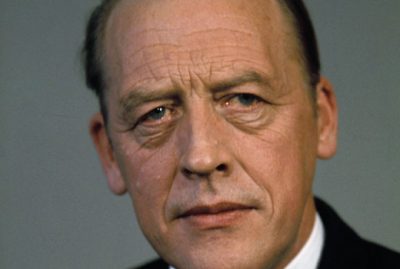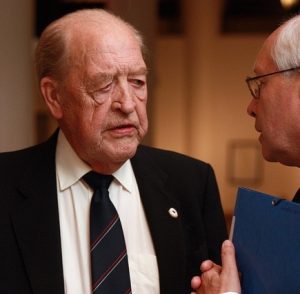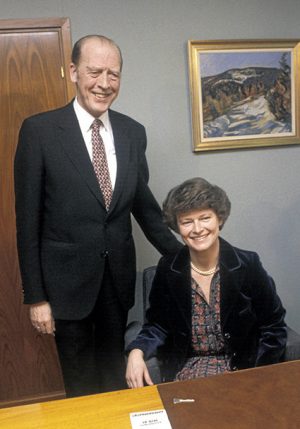Just as Labour Party politicians were wrestling with their latest and deepest crisis this week came news that one of their last leaders from the party’s glory days had died at the age of 90. While Odvar Nordli’s death was not unexpected after years of health problems, the timing of it generated more grief.

“He was the last of the greats from the Labour Party’s greatest era,” Labour veteran, Member of Parliament and former party secretary Martin Kolberg told news bureau NTB. Labour’s current leader Jonas Gahr Støre, who’s had to deal not only with election defeat and a dive in public opinion polls but also the forced resignation of one of his deputies over sexual harassment charges, called Nordli “a pillar in the labour movement’s history. It is with great sorrow we have received the news that our former prime minister died Tuesday evening.”
Nordli rose from humble beginnings in the rural county of Hedmark, where he born at Stange on November 3, 1927. After post-war military service in a devastated Germany, he studied at the University of Oslo and became an accountant for the state. He became active in local politics and rose through the ranks of the Labour Party, elected as a Member of Parliament for Labour in 1961. He was selected to become a government minister, in charge of labour and local government issues, in 1971 and became prime minister in 1976, serving for five years as the once-dominant party found itself challenged by Norway’s emerging oil wealth and the welfare it had worked to create. Voters suddenly wanted more freedom of choice after decades of carefully planned economic growth controlled in large part by the state.

Newspaper Dagens Næringsliv (DN) wrote on Thursday how Nordli came from a post-war generation of Labour Party men who ran Norway as it recovered from years under Nazi German occupation. They saw the need to rebuild the country and guided growth for the common good, also opening up for the oil exploration in the 1960s that eventually turned Norway into one of the wealthiest countries on the planet.
By the 1970s, however, their models for a planned economy were wearing out. Labour leaders had limited ability, according to DN, to recognize or grasp new social and political trends. DN noted how Labour, under Nordli’s leadership, insisted on continuing to regulate store opening hours that went out of date when women joined the labour force and launched careers of their own. People needed to be able to shop after 4- or 5pm.
Labour was also slow to recognize the strength and popularity of the environmental movement that started questioning the oil industry and, most dramatically, the damming up rivers and waterfalls that led to the Alta uprising in Northern Norway. Labour didn’t seem to understand an increasing desire for change and choice, once they could afford both. That later allowed the Conservatives to grab power away from Labour in the 1980s, if only for a few but remarkable years of irreversible change.
Nordli, who did help clear the way for women’s new rights for abortion, was part of the power struggles that also tormented Labour as Norwegian society changed. Political commentator Arne Strand, who once presided over the newspaper most closely alligned with Labour (Arbeiderbladet, now Dagsavisen), called the party’s national meeting in 1975 “one long leadership battle.” Nordli prevailed and became prime minister the next year after a brutal power struggle, and he fell from the top amidst another power struggle and illness five years later.

He scored some major successes along the way, though, and brought unemployment down during his first year as prime minister thanks to the use of massive amounts of state funding. He and Labour won the next election in 1977 with 42.3 percent of the vote, a level of support never seen since. But then came another struggle between Nordli as prime minister and Reiulf Steen as party leader. A young Labour Party woman educated as a doctor, Gro Harlem Brundtland, had also become popular with voters and had her own prescription for success then Nordli fell ill. Brundtland took over and famously became Norway’s first female prime minister with a government that included more women than any other in the world.
Nordli’s health returned and he returned to Parliament but declined to run for re-election in 1985. He became, like so many former top national politicians, the county governor back home in Hedmark. He also became a member of the Norwegian Nobel Committee, serving in the small group that awards the Nobel Peace Prize from 1985 to 1996. He was knighted by King Harald V in 1994.
Strand wrote that Nordli, despite all the power struggles and tough politicking as Labour was challenged by calls for reform, will be remembered as being down-to-earth and practical, with a folkesy style and a twinkle in his eye. He never forgot where he came from and often used his Hedmark dialect at a time when that wasn’t always deemed acceptable in Oslo. He sought cooperation as the party landed in conflict, much like the challenge facing Jonas Gahr Støre today.
“He was a prime minister from a great time of reform in Norwegian politics, and a very genuine fellow human being,” Støre said. He visited Nordli after taking the helm at Labour: “He offered advice and had some words of wisdom. When we talked about municipal reform, he said, ‘Remember Jonas, democracy was never meant to be profitable.’ When we sat at home in his living roomm at Tangen, and he said that, it carried its own weight.”
Norway’s current conservative government coalition announced on Thursday that Nordli will be accorded the rare honour of a state funeral. Not only Labour Party officials are expected to attend in force, and pay their respects.
newsinenglish.no/Nina Berglund

